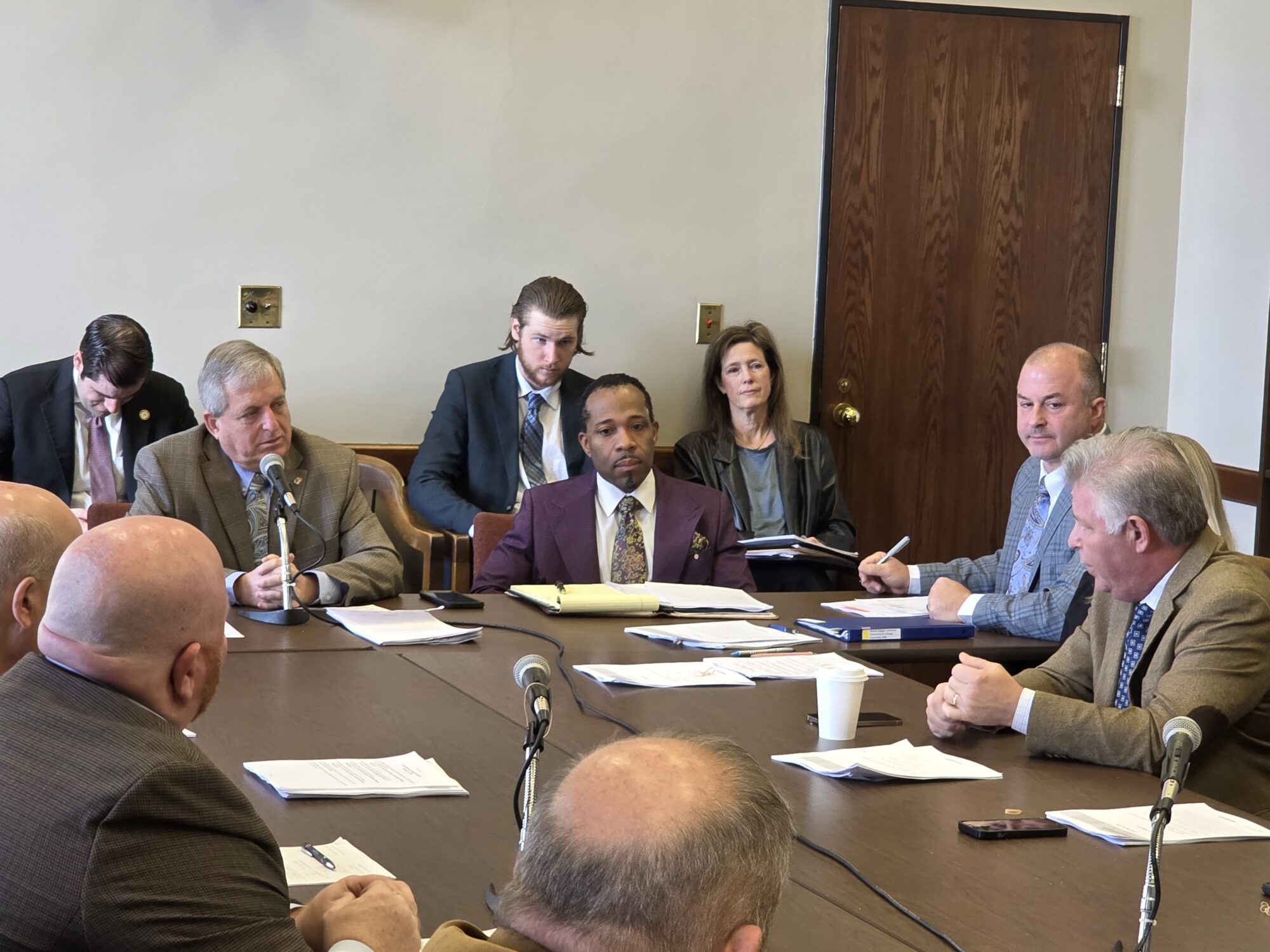
Mississippi State Health Officer Dr. Daniel Edney, addresses members of the Mississippi Joint Legislative Budget Committee during his budget presentation for the state Department of Health, Friday, Sept. 29, 2023, in Jackson, Miss. (AP Photo/Rogelio V. Solis)
- State Health Officer tells Board of Health he’s confident MSDH will move through federal funding challenges, noting the department’s work to reduce its federal funding dependency.
During this week’s quarterly meeting of the Mississippi State Board of Health, members learned that rates of pertussis, otherwise known as whooping cough, in Mississippi are continuing to rise, while syphilis cases appear to be dropping, the Mississippi State Department of Health (MSDH) reports. They also received an update on the preliminary impact of the “one big, beautiful bill” from the State Health Officer.
Whooping cough on the rise
Dr. Renia Dotson, State Epidemiologist for the MSDH, described what the state is doing to address the problem with whooping cough.
Cases of pertussis across the state and nation declined during and immediately after the 2019 COVID pandemic, a trend Dotson said could be attributed to masking practices along with remote work and educational instruction. However, cases began to increase again in 2024 nationally and statewide.
“Here in Mississippi, the number of cases reported in 2024 increased to 49 and was comparable to the number of cases reported in 2019, which was 54,” Dotson explained.
Those numbers demonstrated an increase from the year prior, and Dotson said the trend continues into 2025.
As of July 2, the number of pertussis cases in the state is already at 71, most of which are people aged 18 or younger (54). Of the caseload of people aged 18 and younger, more than half (30) were not vaccinated. Five cases involving a person over the age of 18 were determined to not have been vaccinated.
Data collected by MSDH shows the districts most affected are 2, 7 and 9, with District 2 accounting for 39 percent of the total cases. Dotson pointed out that District 2 is located in the northeast part of the state, while District 9 is comprised of the six coastal counties and District 7 is located in the southwest portion of the state.
One of the factors associated with the increase in cases is a drop in vaccination rates, which puts those who are too young to be vaccinated at risk.
“The herd immunity is dropping for a number of reasons,” Dotson said.
As such, State Health Officer Dr. Daniel Edney recommends first-time grandparents consider getting a booster shot to protect newborns and infants, the portion of the population with smaller airways.
Syphilis on the decline
A positive trend noted in the state is the decline of syphilis cases, though the numbers of the sexually transmitted disease are still concerning.
“Historically, Mississippi has reported some of the highest rates of syphilis nationally,” Dotson explained. “And according to results of the most recent studies, Mississippi has the third highest rate of congenital syphilis and the third highest rate of primary and secondary syphilis.”
Congenital syphilis cases are those where the bacterial infection is passed on to an unborn child, while primary and secondary cases represent the first two stages of the infection.
In 2024, there were 691 cases of primary and secondary syphilis reported. From January to June of this year, there have been 247 cases.
“These are provisional numbers, but for the most part they are looking as if we are hitting the mark and are making a dent,” Dotson added.
The demographic groups most affected by syphilis are black males, followed by black females. Dotson added that white women are more impacted by the sexually transmitted disease than white men.
Instances of late latent cases of syphilis also appear to be on a decline. Last year, there were 1,818 cases compared to 547 so far this year.
“So, at the halfway mark we are still about one third of where we were,” Dotson explained. “We definitely are hoping that those trends hold.”
She added that the same demographic trends apply to late latent cases.
Congenital cases also appear to be declining. A year ago, there were 116 cases reported, and so far this year 35 have been reported.
The area of the state that had the most congenital cases was District 5, which includes the metro Jackson area, along with Districts 8 and 9 along the Coast.
Dr. Edney said part of the reason for the decrease is due to partnerships between his office and local healthcare providers in areas of the state identified as hotspots, such as Jones County. About a year and a half ago his office formed the syphilis task force, which worked to connect testing with treatment. Through those efforts, MSDH acted as the payer of last resort for uninsured cases.
Edney spoke on a recent instance in Jones County, which was identified as a hot spot for cases. Through testing measures conducted at emergency rooms in that county, where about 4 percent of those patients were found to have the infection, treatment was provided to the patient in the ER before being discharged.
“And that has taken that population out of the syphilis pool for Jones County,” Edney described.
Regular mandatory testing during pregnancies have resulted in decreased rates of congenital cases, Edney added.
When asked if the state continues to mandate syphilis tests when applying for a marriage license, Edney explained that it is no longer a requirement.
“It was part of state law that’s been repealed,” Edney said. “I wish they’d put it back.”
Impact of “one big, beautiful bill”
In other matters, Edney addressed the anticipated effects of cuts expected due to the passage of the federal government’s recent reconciliation bill referred to as the “one big, beautiful bill.”
Edney explained how the department has implemented measures to reduce federal funding dependency. About six months ago, his department was at about 65 percent of its budget coming from federal dollars, down from close to 80 percent three years earlier. Part of that change has been the result of an increase in state funding, which he recognized State Rep. Samuel Creekmore (R) and State Senator Hob Bryan (D) for working toward.
“Had we not undertaken that I think we would be in great danger right now, but Dr. Dotson and her team’s work in reorganizing the county health department system into something that’s more meaningful and robust and cost effective and sustainable is a huge dividend for us,” Edney said.
Efforts to get county health departments away from federal funding provided as part of the 2019 COVID pandemic response, which totaled about $10 million a year before the recensions, were also effective.
“I’m confident we will move through the federal funding challenges,” Edney added. “I’m not confident what that will look like this time next year.”










